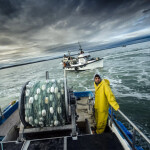A new ranching operation in Scotland may be the first sign of hope for the future of King Scallops (Pecten maximus), a valuable commodity in Scotland that has fallen on low volumes from traditional fishing of late.
With annual landings of around 8,000 metric tons (MT) worth GBP 16 million (USD 24.5 million), scallops harvested in Scotland make up a quarter of total U.K. landings. However, government figures and anecdotal evidence from fishermen indicate a gradual decline in stocks, while processors report a noticeable reduction in the size of scallops landed, particularly from the northwest coast.
Around 5 percent of the reported catch is fished by commercial divers, who can expect a premium 2 to 2.5 times higher than for dredge-caught scallops.
Check out any high class restaurant menu and you will find they advertise “hand dived” rather than dredged scallops, as the debate continues with environmentalists over their concerns for this type of fishery.
According to Jane Grant, a partner in Scot-Hatch, a new scallop ranching venture, the 500 MT of diver caught scallops landed into Scotland do not come close to meeting current demand, and this low level of production ensures that new markets cannot be explored.
“Scotland’s global reputation for the quality of its seafood, along with our company’s sustainable production methods, mean that ranched scallops are very attractive to consumers, chefs and retailers,” she said.
“In particular, they are consistent in size and quality, which is something that chefs really appreciate, we can harvest them at any time, they are fully traceable, and the production method has low environmental impact.”
Scot-Hatch was set up in 2010, with working partners Jane Grant and Scott Campbell committed to perfecting the technique of scallop ranching, which is not widely practiced in the U.K., but is commonplace in other parts of the world.
“We don’t take anything from the wild. Instead, we produce young scallops in a hatchery, tend them in trays and lanterns suspended on longlines through their juvenile stage, then grow them to market size on the seabed, before harvesting them by diver. It takes 4 to 5 years to produce a 125 to 140 mm scallop, so it’s a real commitment,” she said.
“Ranched scallops are good for the wild scallop fishery because they add to the breeding stock, whilst careful site selection and attention to stocking density leads to increased yields. We have found that the meat content of our ranched scallops is far superior to those taken from the local wild fishery,” said Grant.
A recent visit by French actor and restaurateur Gerard Depardieu who owns the 2 Michelin star restaurant La Fontaine Gaillon in Paris, saw their scallops declared as “magnifique” and “superbe!”
For the past 5 years Scot-Hatch has been working with Norwegian company Scalpro, running commercial scale trials. They now hope to develop their business into a thriving, profitable industry, and to set up their own hatchery, rather than sending scallops to Norway to be hatched.
“This could become more than a business; it could become a GBP billion industry, with the potential to kick-start scallop ranching all over the U.K.!” said Grant.
She pointed out that while salmon aquaculture now flourishes in Scotland, shellfish aquaculture remains a poor relation, and despite boasting an 18,000 km coastline, just 3 kg/km of shellfish is produced.
“It is nothing, compared to China, which produces 434,000 MT/ km from its 30,000 km coastline. And over 40 years, Japan increased its production of the Yesso scallop (Patinopecten yessoensis) from 10,000 MT to 400,000 MT using a ranching system.”
Funding the hatchery has proved to be the major stumbling block, as scallop ranching is unproven in the U.K. on a commercial scale. “Want to make a bank manager laugh just before he shows you the door? Present him with our business plan!” said Grant.
However, Scot-Hatch has now entered a competition run by Sir Richard Branson called "pitch to rich," in which businesses of all types place a pitch on the competition web site and encourage people to vote for their favorite. The top 150 pitches will compete for investment money and mentoring by experts.
“We have come a long way using our own funds. We have a shore site and premises that will enable us to move forward with our plans for the hatchery, and are keen to get things moving. Winning this competition would be such a fantastic opportunity for us, and make all the difference to the future of the U.K. scallop industry,” said Grant.






